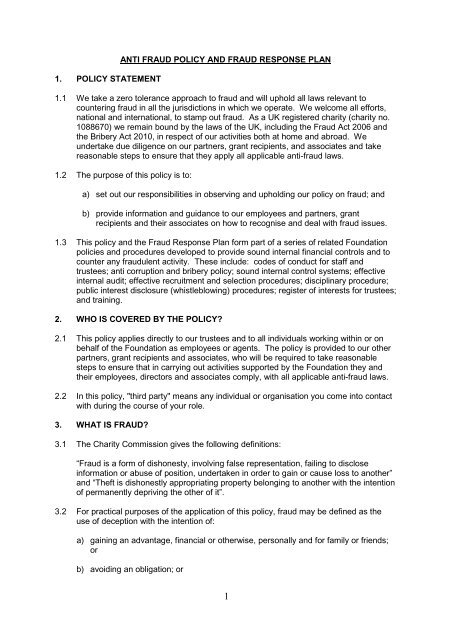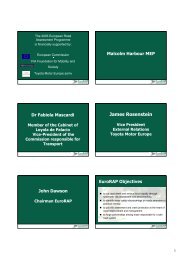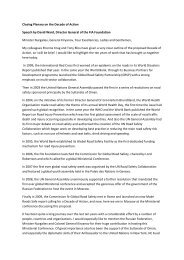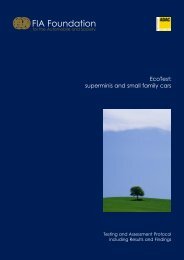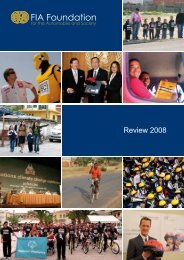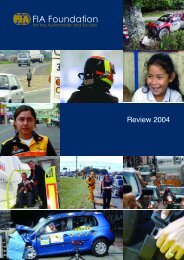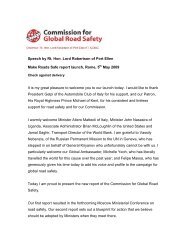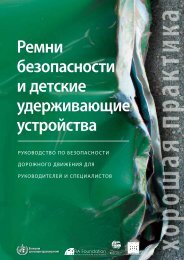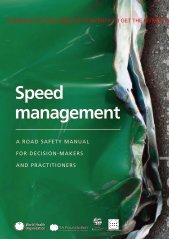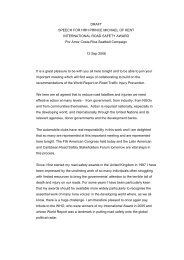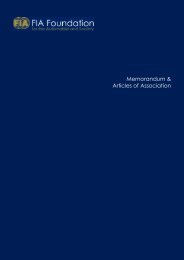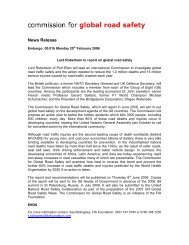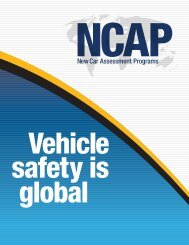Anti-Fraud Policy and Fraud Response Plan - FIA Foundation
Anti-Fraud Policy and Fraud Response Plan - FIA Foundation
Anti-Fraud Policy and Fraud Response Plan - FIA Foundation
Create successful ePaper yourself
Turn your PDF publications into a flip-book with our unique Google optimized e-Paper software.
1. POLICY STATEMENT<br />
ANTI FRAUD POLICY AND FRAUD RESPONSE PLAN<br />
1.1 We take a zero tolerance approach to fraud <strong>and</strong> will uphold all laws relevant to<br />
countering fraud in all the jurisdictions in which we operate. We welcome all efforts,<br />
national <strong>and</strong> international, to stamp out fraud. As a UK registered charity (charity no.<br />
1088670) we remain bound by the laws of the UK, including the <strong>Fraud</strong> Act 2006 <strong>and</strong><br />
the Bribery Act 2010, in respect of our activities both at home <strong>and</strong> abroad. We<br />
undertake due diligence on our partners, grant recipients, <strong>and</strong> associates <strong>and</strong> take<br />
reasonable steps to ensure that they apply all applicable anti-fraud laws.<br />
1.2 The purpose of this policy is to:<br />
a) set out our responsibilities in observing <strong>and</strong> upholding our policy on fraud; <strong>and</strong><br />
b) provide information <strong>and</strong> guidance to our employees <strong>and</strong> partners, grant<br />
recipients <strong>and</strong> their associates on how to recognise <strong>and</strong> deal with fraud issues.<br />
1.3 This policy <strong>and</strong> the <strong>Fraud</strong> <strong>Response</strong> <strong>Plan</strong> form part of a series of related <strong>Foundation</strong><br />
policies <strong>and</strong> procedures developed to provide sound internal financial controls <strong>and</strong> to<br />
counter any fraudulent activity. These include: codes of conduct for staff <strong>and</strong><br />
trustees; anti corruption <strong>and</strong> bribery policy; sound internal control systems; effective<br />
internal audit; effective recruitment <strong>and</strong> selection procedures; disciplinary procedure;<br />
public interest disclosure (whistleblowing) procedures; register of interests for trustees;<br />
<strong>and</strong> training.<br />
2. WHO IS COVERED BY THE POLICY<br />
2.1 This policy applies directly to our trustees <strong>and</strong> to all individuals working within or on<br />
behalf of the <strong>Foundation</strong> as employees or agents. The policy is provided to our other<br />
partners, grant recipients <strong>and</strong> associates, who will be required to take reasonable<br />
steps to ensure that in carrying out activities supported by the <strong>Foundation</strong> they <strong>and</strong><br />
their employees, directors <strong>and</strong> associates comply, with all applicable anti-fraud laws.<br />
2.2 In this policy, "third party" means any individual or organisation you come into contact<br />
with during the course of your role.<br />
3. WHAT IS FRAUD<br />
3.1 The Charity Commission gives the following definitions:<br />
“<strong>Fraud</strong> is a form of dishonesty, involving false representation, failing to disclose<br />
information or abuse of position, undertaken in order to gain or cause loss to another”<br />
<strong>and</strong> “Theft is dishonestly appropriating property belonging to another with the intention<br />
of permanently depriving the other of it”.<br />
3.2 For practical purposes of the application of this policy, fraud may be defined as the<br />
use of deception with the intention of:<br />
a) gaining an advantage, financial or otherwise, personally <strong>and</strong> for family or friends;<br />
or<br />
b) avoiding an obligation; or<br />
1
c) causing a financial loss to the <strong>Foundation</strong>.<br />
3.3 A fraudulent act can take many forms, for example, theft – removal or misuse of funds,<br />
assets or cash; false accounting - dishonestly destroying, defacing, concealing or<br />
falsifying any account, record or document required for any accounting purpose, with a<br />
view to personal gain or gain for another, or with the intent to cause loss to the<br />
<strong>Foundation</strong> or furnishing information which is or may be misleading, false or<br />
deceptive; or abuse of position – abusing authorities <strong>and</strong> misusing <strong>Foundation</strong><br />
resources or information for personal gain or causing loss to the <strong>Foundation</strong>.<br />
3.4 Those engaged in fraud can include an employee, officer, trustee or director, any<br />
person acting on behalf of the <strong>Foundation</strong> i.e. our agents, individuals or organisations<br />
who authorise someone else to carry out these acts, government or public officials<br />
whether foreign or domestic.<br />
4. PREVENTION<br />
4.1 <strong>Fraud</strong> is costly, both in terms of reputational risk <strong>and</strong> financial losses, as well as timeconsuming<br />
to identify <strong>and</strong> investigate, disruptive <strong>and</strong> unpleasant. The prevention of<br />
fraud is therefore a key objective. Measures should be put in place to deny<br />
opportunity <strong>and</strong> provide effective leadership, auditing, employee screening<br />
procedures, which deny opportunities for fraud.<br />
4.2 <strong>Fraud</strong> can be minimised by carefully designed <strong>and</strong> consistently operated procedures<br />
which deny opportunities for fraud. Staff are made aware of policies through the<br />
Employee H<strong>and</strong>book <strong>and</strong> updates are circulated by email.<br />
4.3 The internal financial controls help to ensure that at all times the financial<br />
management of the <strong>Foundation</strong> is conducted in accordance with the highest<br />
st<strong>and</strong>ards. Regular management review of systems <strong>and</strong> reports by internal audit in<br />
line with the agreed annual audit programme should assist in preventing <strong>and</strong> detecting<br />
fraud; <strong>and</strong> should also result in continuous improvements. The risk of fraud should be<br />
a factor for consideration in audit plans.<br />
4.4 The credibility <strong>and</strong> success of the <strong>Anti</strong>-<strong>Fraud</strong> <strong>Policy</strong> <strong>and</strong> <strong>Fraud</strong> <strong>Response</strong> <strong>Plan</strong> is<br />
dependent largely on how effectively it is communicated throughout the organisation.<br />
To this end, details of the <strong>Policy</strong> <strong>and</strong> <strong>Fraud</strong> <strong>Response</strong> <strong>Plan</strong> will be provided to all staff<br />
<strong>and</strong> trustees.<br />
5. YOUR RESPONSIBILITIES<br />
5.1 You must ensure that you read, underst<strong>and</strong> <strong>and</strong> comply with this policy.<br />
5.2 The prevention, detection <strong>and</strong> reporting of fraud are the responsibility of all those<br />
working for the <strong>Foundation</strong> or under our control. You are required to avoid any activity<br />
that might lead to, or suggest, a breach of this policy.<br />
5.3 You must notify your line manager as soon as possible if you believe or suspect that a<br />
conflict with this policy has occurred, or may occur in the future.<br />
5.4 Any employee who breaches this policy will face disciplinary action, which could result<br />
in dismissal for gross misconduct. We reserve our right to terminate our contractual<br />
relationship with our partners, grant recipients, <strong>and</strong> associates if they breach this<br />
policy.<br />
2
6. RECORD-KEEPING<br />
6.1 We must keep financial records for six years <strong>and</strong> have appropriate internal controls in<br />
place which will evidence the business reason for making payments to third parties.<br />
6.2 You must ensure all expenses claims relating to hospitality, gifts or expenses incurred<br />
to third parties are submitted in accordance with our expenses policy, <strong>Anti</strong>-Bribery <strong>and</strong><br />
Corruption <strong>Policy</strong> <strong>and</strong> Gifts <strong>and</strong> Hospitality <strong>Policy</strong> <strong>and</strong> specifically record the reason<br />
for the expenditure.<br />
6.3 All accounts, invoices, memor<strong>and</strong>a <strong>and</strong> other documents <strong>and</strong> records relating to<br />
dealings with third parties, such as clients, suppliers <strong>and</strong> business contacts, should be<br />
prepared <strong>and</strong> maintained with strict accuracy <strong>and</strong> completeness. No accounts must<br />
be kept "off-book" to facilitate or conceal improper payments.<br />
7. HOW TO RAISE A CONCERN<br />
You are encouraged to raise concerns about any issue or suspicion of malpractice at the<br />
earliest possible stage. If you are unsure whether a particular act constitutes fraud, or if you<br />
have any other queries, these should be raised with the Director of Governance <strong>and</strong><br />
Personnel or your line manager. Concerns should be reported as a protected disclosure to<br />
a Director or the Chairman. Statutory protection of whistle blowers is afforded under the<br />
Public Interest Disclosure Act 1998.<br />
8. PROTECTION<br />
8.1 Employees who raise concerns or report another's wrongdoing are sometimes worried<br />
about possible repercussions. We aim to encourage openness <strong>and</strong> will support<br />
anyone who raises genuine concerns in good faith under this policy, even if they turn<br />
out to be mistaken.<br />
8.2 We are committed to ensuring no one suffers any detrimental treatment as a result of<br />
refusing to take part in fraud, or because of reporting in good faith their suspicion that<br />
an actual or potential fraudulent act has taken place, or may take place in the future.<br />
Detrimental treatment includes dismissal, disciplinary action, threats or other<br />
unfavourable treatment connected with raising a concern. If you believe that you have<br />
suffered any such treatment, you should inform the Director of Governance <strong>and</strong><br />
Personnel immediately.<br />
9. TRAINING AND COMMUNICATION<br />
9.1 All employees will receive relevant training on how to implement <strong>and</strong> adhere to this<br />
policy.<br />
9.2 Our zero-tolerance approach to fraud will be communicated to all partners, grant<br />
recipients, associates, suppliers, <strong>and</strong> contractors at the outset of our relationship with<br />
them <strong>and</strong> as appropriate thereafter.<br />
10. WHO IS RESPONSIBLE FOR THE POLICY<br />
10.1 The Board of Trustees has overall responsibility for ensuring this policy complies with<br />
our legal <strong>and</strong> ethical obligations, <strong>and</strong> that all those under our control comply with it.<br />
3
10.2 The Director of Governance <strong>and</strong> Personnel has primary <strong>and</strong> day-to-day responsibility<br />
for implementing this policy <strong>and</strong> for monitoring its use <strong>and</strong> effectiveness <strong>and</strong> dealing<br />
with any queries on its interpretation. Management at all levels are responsible for<br />
ensuring those reporting to them are made aware of <strong>and</strong> underst<strong>and</strong> this policy <strong>and</strong><br />
are given adequate <strong>and</strong> regular training on it.<br />
11. RISK ASSESSMENT, MONITORING, AND REVIEW<br />
11.1 As part of its annual risk assessment process the Board of Trustees will monitor the<br />
effectiveness <strong>and</strong> review the implementation of this policy, considering its suitability,<br />
adequacy <strong>and</strong> effectiveness. The Director of Governance <strong>and</strong> Personnel will carry out<br />
regular audits of our control systems <strong>and</strong> procedures to provide assurance that they<br />
are effective in countering fraud.<br />
11.2 All employees are responsible for the success of this policy <strong>and</strong> should ensure they<br />
use it to disclose any suspected danger or wrongdoing.<br />
11.3 This policy does not form part of any employee's contract of employment <strong>and</strong> it may<br />
be amended at any time.<br />
4
FRAUD RESPONSE PLAN<br />
The purpose of this plan is to define authority levels, responsibilities for action, <strong>and</strong><br />
reporting lines in the event of a suspected fraud. This plan may not be appropriate for<br />
concerns that are not fraud related such as bribery, anti-competitive behaviour or other<br />
irregularity.<br />
1. All actual or suspected incidents should be reported without delay to a line manager<br />
or the Director General or Chairman, who should as soon as possible convene a<br />
project group of the following people or their nominees to decide on the initial<br />
response:<br />
• the Director General <strong>and</strong> or Chairman who shall chair the meeting;<br />
• the Financial Controller<br />
• Director of Governance <strong>and</strong> Personnel; <strong>and</strong><br />
• Others as determined by the Chair such as legal experts.<br />
The project group will decide on the action to be taken, normally an investigation. If<br />
necessary, external specialist investigative auditors <strong>and</strong>/or legal experts may be<br />
appointed to carry out the investigation.<br />
2. The Chairman of the Audit Committee should be advised at the earliest stage when an<br />
investigation under this procedure has been initiated.<br />
3. Where an investigation is to take place, <strong>and</strong> the matter implicates any of the<br />
individuals mentioned above, another person with senior management responsibility<br />
shall be appointed by the Chairman of the Audit Committee.<br />
4. Prevention of further loss: where initial investigation provides reasonable grounds<br />
for suspecting a staff member of fraud, the project group will decide how to<br />
prevent further loss. The staff member under suspicion will be suspended on full pay.<br />
5. In these circumstances, the suspect(s) should be approached unannounced <strong>and</strong><br />
should be interviewed about the allegation prior to being informed of their suspension.<br />
They should be supervised at all times before leaving the <strong>Foundation</strong>’s premises.<br />
They should be allowed to collect personal property under supervision, but should not<br />
be able to remove any property belonging to the <strong>Foundation</strong>. Any security passes<br />
<strong>and</strong> keys to premises, offices, <strong>and</strong> furniture should be returned. Laptop computers,<br />
mobile phones, blackberries, iPads etc <strong>and</strong> associated hardware/software must also<br />
be returned. The <strong>Foundation</strong>’s Head of IT should be instructed to immediately<br />
withdraw access permissions to the <strong>Foundation</strong>’s computer systems.<br />
6. The project group will consider whether it is necessary to investigate systems other<br />
than that which has given rise to suspicion, through which the suspect may have had<br />
opportunities to misappropriate the <strong>Foundation</strong>’s assets.<br />
7. Recovery of losses is a major objective of any fraud investigation. The project<br />
group will ensure that, in all fraud investigations, the amount of any loss is quantified.<br />
Repayment of losses will be sought in all cases.<br />
5
Where the loss is substantial, legal advice may be obtained about the need to freeze<br />
the suspect’s assets through the court, pending conclusion of the investigation. Legal<br />
advice may also be obtained about prospects for recovering losses through the<br />
civil court, where the perpetrator refuses repayment. The <strong>Foundation</strong> will normally<br />
expect to recover costs in addition to losses.<br />
If appropriate, the Director of Governance <strong>and</strong> Personnel will liaise with the <strong>Foundation</strong>’s<br />
insurance brokers to process a claim.<br />
8. Reporting to the Board of Trustees: any incident shall be reported without delay by<br />
the Chairman to the Board of Trustees <strong>and</strong> updates shall be given on a<br />
regular basis on the investigation.<br />
9. On completion of the investigation, a written report shall be submitted to the<br />
Board of Trustees containing a description of the incident, including the value of any<br />
loss, the people involved; the means of perpetrating the fraud; the measures taken to<br />
prevent a recurrence; <strong>and</strong> any action needed to strengthen future responses to fraud,<br />
with a follow-up report on whether the actions have been taken. This report will<br />
represent the definitive document on which management (in a disciplinary situation)<br />
<strong>and</strong> possibly the Police (in a criminal situation) will base their decision.<br />
Examples <strong>and</strong> Indicators of <strong>Fraud</strong><br />
Examples of fraud, which are neither exclusive nor exhaustive, include the following:<br />
• Misappropriation of cash;<br />
• <strong>Fraud</strong>ulent encashment of payable orders or cheques;<br />
• Misappropriation of other assets including information <strong>and</strong> intellectual property.<br />
This would also include unauthorised use of <strong>Foundation</strong> property e.g. computers,<br />
other equipment;<br />
• Purchasing or purchase ledger fraud (e.g. approving/paying for goods not received,<br />
approving/paying bogus suppliers, approving/paying inflated prices for goods <strong>and</strong><br />
services, accepting any bribe);<br />
• Travel <strong>and</strong> Expense claims overstated or falsely claimed. This may include<br />
advances not recovered or forging of counter-signatories;<br />
• Accepting pay for time not worked (e.g. false claim for hours worked, failing to work<br />
full contracted hours by any member of staff, false overtime claims, or falsification of<br />
sickness self-certification);<br />
• Computer fraud (e.g. altering or substituting records, duplicating or creating spurious<br />
records, or destroying or suppressing records), where IT equipment has been used<br />
to manipulate program of data dishonestly, or where the use of an IT system was a<br />
material factor in the preparation of the fraud.<br />
Whilst by no means being proof alone, the circumstances below (warning signs) may<br />
indicate fraud, <strong>and</strong> should therefore alert staff:<br />
• Altered documents (correcting fluid, different pen or h<strong>and</strong>writing);<br />
• Claim form details not readily checkable or properly approved;<br />
• Changes in normal patterns, of cash takings or expense claim details (for example);<br />
• Delay in completion or submission of expense claims;<br />
• Lack of vouchers or receipts in support of expense claims, etc;<br />
• Staff seemingly living beyond their means;<br />
• Staff under constant financial or other stress;<br />
6
• Staff choosing not to take annual leave (<strong>and</strong> so preventing others becoming involved<br />
in their work), especially if solely responsible for a “risk” area;<br />
• complaints from staff.<br />
7
“Do’s <strong>and</strong> Don’ts”<br />
In addition to the warning signs outlined above, staff are advised to take notice of the following in respect of possible fraud-related<br />
instances or actions:<br />
DO<br />
Make a note of your concerns<br />
Record all relevant details, such as the nature of your<br />
concern, the names of parties you believe to be involved,<br />
details of any telephone or other conversations with names<br />
dates <strong>and</strong> times <strong>and</strong> any witnesses.<br />
Notes do not need to be overly formal, but should be timed,<br />
signed <strong>and</strong> dated.<br />
Timeliness is most important. The longer you delay writing up,<br />
the greater the chances of recollections becoming distorted<br />
<strong>and</strong> the case being weakened.<br />
Retain any evidence you may have<br />
The quality of evidence is crucial <strong>and</strong> the more direct <strong>and</strong><br />
tangible the evidence, the better the chances of an effective<br />
investigation.<br />
Report your suspicions promptly<br />
All concerns must be reported to the appropriate person<br />
detailed in the <strong>Fraud</strong> <strong>Response</strong> <strong>Plan</strong>.<br />
Adopted by the Board of Trustees 26 March 2013<br />
DON’T<br />
Be afraid of raising your concerns<br />
The Public Interest Disclosure Act provides protection for<br />
employees who raise reasonably held concerns through the<br />
appropriate channels – whistle blowing.<br />
You will not suffer discrimination or victimisation as a result of<br />
following these procedures <strong>and</strong> the matter will be treated sensitively<br />
<strong>and</strong> confidentially where the concern raised is genuine <strong>and</strong> held in<br />
good faith.<br />
Seek to obtain evidence not already in your possession or in<br />
any other way carry out your own investigation into your<br />
suspicions<br />
There may be a perfectly reasonable explanation for the events that<br />
give rise to your suspicion. Spreading unsubstantiated concerns<br />
may harm innocent persons.<br />
Approach the person you suspect or try to investigate the<br />
matter yourself<br />
There are special rules relating to the gathering of evidence for<br />
use in criminal cases. Any attempt to gather evidence by<br />
persons who are unfamiliar with these rules may undermine the<br />
case.<br />
Convey your concerns to anyone other than authorised<br />
persons listed in the <strong>Foundation</strong>’s <strong>Fraud</strong> <strong>Response</strong> <strong>Plan</strong><br />
8


